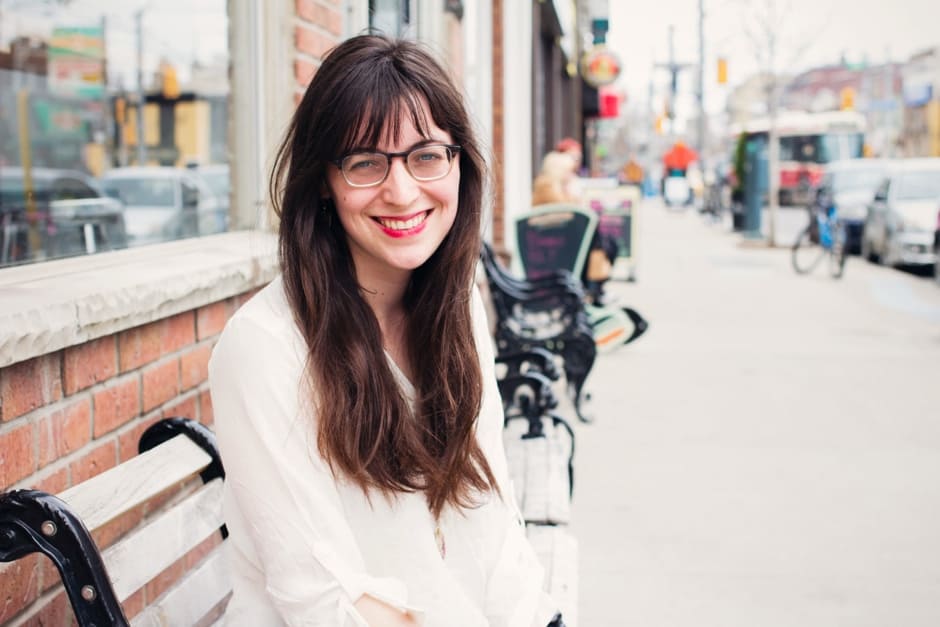In the past few years, Rosamund Small has burst onto the Toronto theatre scene as a young playwright to watch. Her successes include productions at Docket Theatre, Passe Muraille, and jobs with The Paprika Festival and Crows Theatre. When not cultivating her impressive resumé, she’s working on her undergraduate degree in Drama and Sexual Diversity at U of T.
Vitals, Small’s latest and most ambitious production to date, premiered this month at Theatre Passe Muraille through Outside the March Productions. The play is a site-specific, immersive experience that follows Anna, an EMS response worker, while on a 911 emergency call. The piece, based on interviews with paramedics, explores a variety of deeply moving emergency stories from the perspective of the response worker. The production has been highly successful, receiving rave reviews, two extensions of its run, and playing to consistently sold-out audiences.
Earlier this week, Small sat down with The Varsity to talk about Vitals, U of T, and her success thus far.
Getting here
When asked about the chain of events that led her to Vitals, Small explained that one thing led to another, beginning several years ago with her play Performing Occupy Toronto.
“Things just have to fall into place,” says Small. “Occupy was produced by a very small company. I helped found it. We started in high school. That was a verbatim show, a word-for-word show based on real-life interviews.”
The following year, Small was on the staff of The Paprika Festival. One of her peers was Mitchell Cushman, who went on to direct Vitals. He heard the first draft of the show at a fundraiser.
“Mitchell from then onwards was very intrigued and he called me and said, ‘I want to direct this,’” recalls Small, “It was very exciting but we had no framework, we had no timeline.”
Small wrote the initial monologue of the show in a playwriting class at U of T. She cites playwriting teacher Djanet Sears as an invaluable influence on her work.
“She was the first person to encourage me to write the play. She really takes her students work very seriously and is very loving and very forgiving,” Small said of Sears. “I also think there are a couple of courses that are just dreams. Like Leah Cherniak’s directing class, how amazing is that?”
Engaging in the community
Growing up in Toronto, Small always wanted to be a playwright. She prefers writing plays to writing fiction in prose, she says, because she views it as a collaboration of possibilities.
“Many people think of being a playwright as being an intellectual endeavour, but I also think of it as being very social and being the making of a play as opposed to the writing of a script,” Small adds.
Collaboration and participation in the theatre community are major factors in Small’s drive and success.
“I would say that it does take time, it’s important not to expect too much too quickly. You have to invest yourself in the community. 70 per cent of my theatre education is just going and sitting in theatres and thinking and chatting with people about the shows,” she said.
Small reflected that, by fostering a genuine interest in the work of others, she was able to find her natural place in the Toronto theatre community.
“In the end it is possible,” she notes, “Honestly, if you go to four plays of a theatre artist in Toronto they will want to talk to you. You want to have artistic knowledge of the people you want to work with.”
An “unconventional” approach
Small’s individual style is marked by two clear motifs throughout her body of work: that it is site-specific, and that it is verbatim. Verbatim theatre is a newly popular style of playwriting, in which the playwright compiles transcripts from real-life interviews. Small’s first play, Performing Occupy Toronto, was strictly verbatim in form. Although Vitals is not strictly verbatim, the piece began with interviews, which Small then used to write Anna’s dialogue. She explains her attraction to verbatim as being rooted in her desire to create genuine and truthful theatre.
“Something must deeply interest you and connect you with what you’re trying to put on stage and interviews are a great way to do that because when you’re speaking to someone about something they’re passionate about they have a drive in their voice,” she describes.
Small also expressed her fear of melodrama, which she avoided for a long time by writing comedy. In order to progress from verbatim into fiction, almost everything she writes has an impulse from reality.
The immersive, site-specific nature of Vitals stems from a desire to surprise, rather than to shock.
“I do like to be surprised,” says Small, grinning. Her plays are reliably surprising, as in Vitals, which rejects traditional staging and takes the audience through several rooms of a house.
“To be in a nontraditional space is often more surprising,” Small contends, “And I really do love traditional theatre, but I also feel there’s something interesting about how we’re always sitting in a theatre with the lights down.”
Surprises to come
Small is currently working on a play that abandons the interview process altogether. It even “has magic,” she hints, laughing, “so it doesn’t have to be fact to be truthful.”
Small hopes to see more risk-taking in Toronto theatre: “If I had a wish for Toronto and what we did in theatre, I would say bigger investment and bigger risk. For me I would like every show that is made to have the sense that it is different than anything that’s ever been done. I just really like to be surprised.”
For audiences, Small expresses a similar desire to see spectators more engaged in theatre.
“A complaining audience means that they’re invested,” she says, “Make your voice heard. Do your research. Know what’s going on, chat with people, read descriptions, there’s really a huge variety. The form is not limited.”


